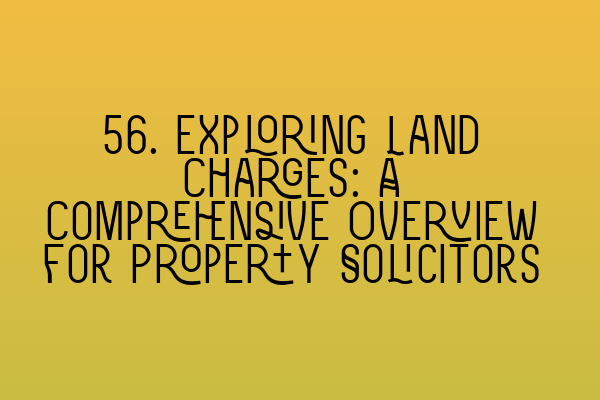Exploring Land Charges: A Comprehensive Overview for Property Solicitors
Welcome to SQE Property Law & Land Law, your trusted source for expert advice in the field of property law. In today’s blog post, we will be diving deep into the world of land charges, providing you with a comprehensive overview that every property solicitor needs to know. Whether you’re a seasoned professional or just starting out in your legal career, understanding land charges is crucial to ensuring smooth property transactions. So, without further ado, let’s get started!
What are Land Charges?
Land charges are legal burdens or restrictions that may affect a property and its ownership. These charges are registered against the property and can have a significant impact on its value and use. As a property solicitor, it is your responsibility to identify and address any existing land charges to protect your clients’ interests.
Land charges can be divided into two broad categories: registered charges and unregistered charges. Registered charges are those that are recorded and searchable in the Land Charges Register, while unregistered charges are not officially recorded but may still have legal implications. Let’s explore each category in more detail.
Registered Charges
The Land Charges Register is maintained by the Land Registry and contains details of various charges that can affect a property. These charges include:
- Restrictive Covenants: These are agreements that restrict the use or development of the property. They may be imposed by previous owners or contained within the title deeds.
- Mortgages: A mortgage is a loan secured against the property. When a mortgage is taken out, it is registered with the Land Registry to protect the lender’s interest.
- Notices: Notices are legal warnings or notifications that may affect a property. They can include bankruptcy notices, orders for the sale of land, or rights of preemption.
- Caution Against First Registration: A caution is a notice placed on the Land Charges Register to protect a potential interest or claim to the property.
- Land Charges Act Returns: These returns provide information on interests in land arising from matters such as trusts of land, manorial rights, or franchises.
As a property solicitor, it is essential to search the Land Charges Register thoroughly and advise your clients on any registered charges that may affect the property they are interested in purchasing or selling. Failing to identify and address these charges can have serious legal and financial consequences.
Unregistered Charges
While unregistered charges are not officially recorded in the Land Charges Register, they can still impact a property’s ownership. These charges may include:
- Easements: Easements are rights that one property owner may have over another property, such as a right of way or the right to access utility services.
- Equitable Interests: Equitable interests are rights or interests in a property that have not been registered with the Land Registry. These interests can arise from agreements, contracts, or even verbal arrangements.
- Overreaching Interests: When a property is sold, certain interests, such as beneficial interests under a trust, are “overreached” and do not affect the purchaser directly.
As a property solicitor, it is crucial to investigate and disclose any known unregistered charges to your clients. Ignoring these charges can lead to disputes and legal complications down the line.
Identifying and Addressing Land Charges
Identifying and addressing land charges is a complex process that requires careful research and analysis. Here are some steps you can take as a property solicitor to ensure that no charges are overlooked:
- Conduct a thorough search of the Land Charges Register using the appropriate forms and procedures. This search will reveal any registered charges that may affect the property.
- Review the property’s title deeds and any associated documentation carefully. These documents may contain important information about existing restrictions or agreements.
- Engage with relevant parties, such as lenders, local authorities, or landowners, to gather additional information about potential charges.
- Consult with experienced colleagues or seek legal advice to ensure a comprehensive understanding of the potential implications of any identified charges.
Once land charges have been identified, it is crucial to address them appropriately to protect your clients’ interests. This may involve negotiating with affected parties, obtaining necessary consents or waivers, or even applying to the Land Registry for the removal of certain charges.
Conclusion
As a property solicitor, a thorough understanding of land charges is essential to providing effective legal advice to your clients. By carefully searching the Land Charges Register, identifying and addressing both registered and unregistered charges, and engaging with relevant parties, you can ensure that your clients are protected throughout the property transaction process.
If you’re interested in furthering your knowledge and skills in property law and land law, we encourage you to explore our related articles:
- SQE 1 Practice Exam Questions
- SQE 1 Practice Mocks FLK1 FLK2
- SQE 2 Preparation Courses
- SQE 1 Preparation Courses
- SRA SQE Exam Dates
At SQE Property Law & Land Law, we are committed to providing high-quality resources and professional guidance to help you excel in your legal career. If you have any questions or need further assistance, please don’t hesitate to reach out to our team. Happy learning!
